Gulfstar 44 Mark 2 Sailboat Aftcabin
1980 Gulfstar
| Condition: | Used |
| Make: | Gulfstar |
| Year: | 1980 |
| Location: | Key West, Florida, United States |
| Want to buy? | Contact seller! |
Description
Selling this Salvage 44, Gulfstar Mark II,
The Vessel is located in the Domincan Republic in Luperon
Vessel was in a fire.
Damage report
CIRCE HAD AN ELECTRICAL FIRE IN THE AFT CABIN [SEE PICS]
The fired did not burn, or strructurally affect the fiberglass in the hull or deck piece.
liner is 1/3 okay.
Aft Cabin sustained most of the damage.
aft cabin wood veneer and trim was burnt.
The structure of the Fiberclass was not burnt.
[one small spot, where one layer of the roven has delaminated on the inside.]
Boat has all kinds of sails
Dingy, inflatable does not go with the GulfStar.
ELLING THIS SALAVAGE GULFSTAR CHEAP IN THE DOMINICAN REPUBLIC
Center-cockpit racer/cruiser model
CIRCE HAD AN ELECTRICAL FIRE IN THE AFT CABIN [SEE PICS]
The fired did not burn, or strructurally affect the fiberglass in the hull or deck piece.
liner is 1/3 okay.
I was just going to pull out all the charred and damaged trim and panneling, and lightly grind out any black or carbon, and paint the cabinside to remove,
Main cabin:
The headliner is ruptured. Burnt in places, overheated and brittle in other spots, and ripped in others
Forward Cabin.
Has some minor smoke damage
The basic mechanical part of the vessel was not affected by the fire.
Sails are there.
Will trade for anything real good. Willing to fiance someone with good credit and collateral
Gulfstar 44 Review: One of the Best Designs Ever
Gulfstar 44 PDF Brochure =
Vince Lazzara was not a beginner when he started Gulfstar in 1970. He had previously co-owned Columbia Yachts. Lazzara keenly knew what would sell and big bathtub motorsailers were in demand in the early 1970's. If you wanted a powerboat, they pumped out an early Gulfstar. If you wanted a sailboat, they would stick on a mast like the 53 motorsailer which doubled as a displacement trawler. Gulfstar produced roomy motorsailers in their Tampa Bay factory. Around 1978 when consumer tastes changed so did Gulfstar. Lazzara switched to producing high performance sailboats. There is confusion with the 44 Gulfstar because they produced an early 1970's motorsailer version. The early 1980's Gulfstar 44 CC is a whole different animal and one these performance designs.
John Kretschmer, a former Hylas skipper, said one time to me about the Gulfstar 44, "You know that's a great design. I'm as connected to Hylas as anybody but I'd say the Gulfstar 44 is a better design than the Hylas 44. It's the boat everybody's looking for. Add a few more portholes to get more light in the interior and. . .I can't think of a better design." Lazzara was a master of beauty above, speed below, and comfort inside. You'll find these with either an athwartship king or centerline queen aft. The step down U-shaped galley is seaworthy with great headroom. If you are looking at 44 Peterson or 44 Hylases, you might also consider the 44 Gulfstar.
Gulfstar 44
Gulfstar 44
First Impressions
What gives the Gulfstar 44 more flair than other designs is her counter stern. Lazzara pulled it off well on the 44 as the slight overhang and reverse transom combine for a handsome look -- not modern or classic. This 44-footer is one of those designs in life that keeps in style while the passing fancies cascade away. Gulfstar brochures credit the design to R. C. "Dick" Lazzara, Vince's son, but you can see a heavy influence of dear old dad. Underneath she has a modern fin keel and skeg hung rudder. Overall, Lazzara helped pioneer the raked bow centercockpit cruiser look we see today in most production boats. Her cabintrunk is modest with a slight sheer. She is nice with that touch of flair with the stern. She has quite a bit of teak on deck in the cockpit. A fine teak toerail runs around along with the handles. If you are looking for the lowest maintenance boat, the 44 is a more classic, prettier style with the wood. It does not have all stainless steel or plastic as these days you will find on sensible production yachts.
Gulfstar 44 Mark I
Gulfstar 44 Mark I
Construction
There are two different tracks here that are important to keep distinct: design and construction. As the designs moved from motorsailers to performance centercockpit cruisers, the construction on a separate tack improved. These are not really related. It is not that Gulfstar made all motorsailers inexpensively or all cruisers high quality. It just so happened that as they became more experienced and improved their workmanship, they switched to building a different type of design. Late model motorsailers like the 47 Sailmaster series benefited from the increase in skills at the Gulfstar factory.
Gulfstar 44 Galley
In the early 1970's, Gulfstar construction was lower quality than later on. When I say lower quality, I can illustrate this by certain techniques. In general the dividing line is somewhere around 1978. Before 1978, the interiors were mostly Formica -- inexpensive and functional. After then, the interiors were teak verneer and used a patented process to camber edges. The dark teak joinery work is as good or better than any manufacturer out there especially in the late 1980's. Also before 1978 approximately, they used iron ballast and afterwords lead ballast both encapsulated. Lead ballast is one of the fundamental ways to improve performance by using a denser material to lower center of gravity. All the Gulfstar 44's, most the 50's, and all the 47's have lead ballast. Gulfstar used a solid hull layup and balsa core deck. Longitudinal stringers and transverse floors stiffen the hull. The joint is the traditional inner flange bolted and glued with 5200. The mast is keel stepped.
But despite the increase in quality as Gulfstar became more experienced, they were still hit hard by blister problems throughout. The oil embargo caused all manufacturers in this era to try innovative ways to save resin. The chopper gun probably affected them too. And this was before the wide use of blister preventing vinylester resins. If there is one thing that even later Gulfstars including 44's can be affected by, that is blister problems. They call this the blister pox of the 1980's. I think it is critical to ask about the blister history and last time a bottom job has been done on a Gulfstar irrespective of the era.
Gulfstar 44 Mark II PDF Specifications (Click to Download)
Down Below
Down below is really where the Gulfstar 44 shines. The dark teak joinery work is stunning and attests to the high quality of Gulfstar's later workmanship. The layout with her aft stateroom is nice. One of the most attractive combinations clients look for is a centerline queen aft stateroom as on the Mark II versions. The Mark I versions have an athwartship king which is a practical, seaworthy berth and impressive as well. On the layout, you can see she has a large berth aft. And she has two heads with separate showers for and aft. The heads look like they have slightly different orientation of the sink and shower between the Mark I and II versions according to company literature. Another great feature is the step down galley. The 44 has nice headroom anyway but with the step down galley even the tallest came stand up straight. And, the galley is tight and seaworthy without seeming small. If I designed a boat, I would make the galley just like the 44.
Gulfstar 44 Engine
Engine and Underway
The engine room is not the best I have seen. It is large and similar to the 50 Gulfstar but a little lower and further in there. Access is via the passageway and a cutout from the aft stateroom. The engine is either the venerable Perkins 4-108 or 4-154. Expect the 4-108 to burn oil, but otherwise run like a top if properly maintained. The beefier 4-154 is great except that parts are hard to find. There is plenty of room for a generator, watermaker, and other additional equipment. In general when looking at brokerage listing you will see those with high and low hour engines. Clients clearly prefer a newer, lower hour engine and the price differential is somewhere like $20k to $30k.
Gulfstar 44 Mark II
Gulfstar 44 Mark II
One owner of the Gulfstar 44 described her in heavy seas, "She really handles well and loves rough weather. The rougher it gets the better she performs. We took a trip on a catamaran which really pounded to Australia. We should have taken our 44. She does never pounds but smooth rides. We always feel safe and controlled." She is a heavier cruiser and known to sail far and wide. You can feel down below her strength and quality. With her fin keel and skeg hung rudder, she is a performance cruiser unlike the early model 44's which were motorsailers that should not be taken offshore.
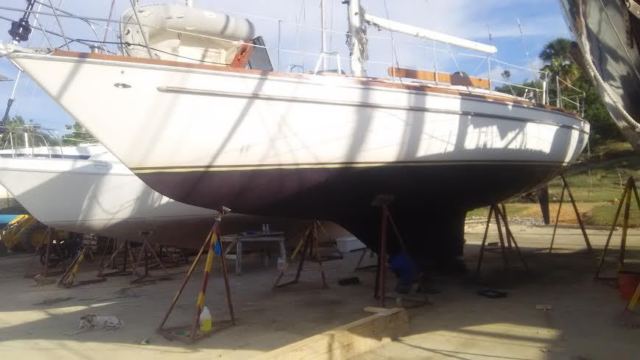
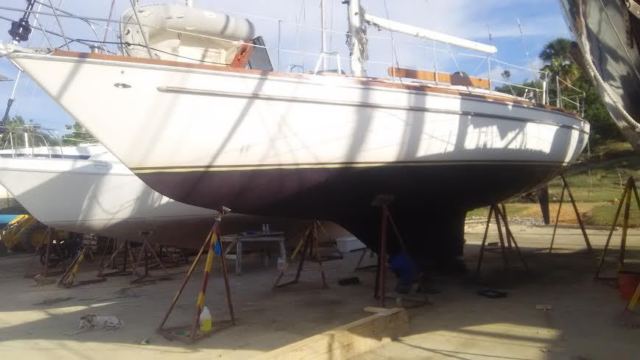
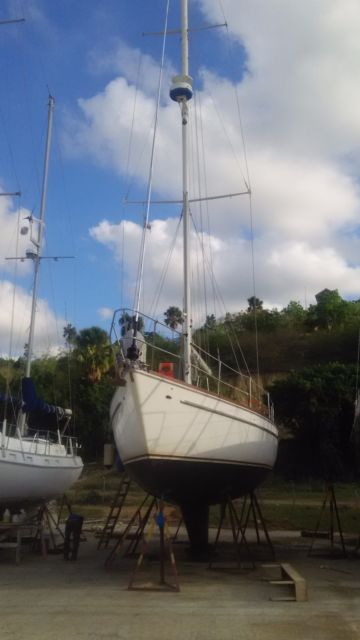
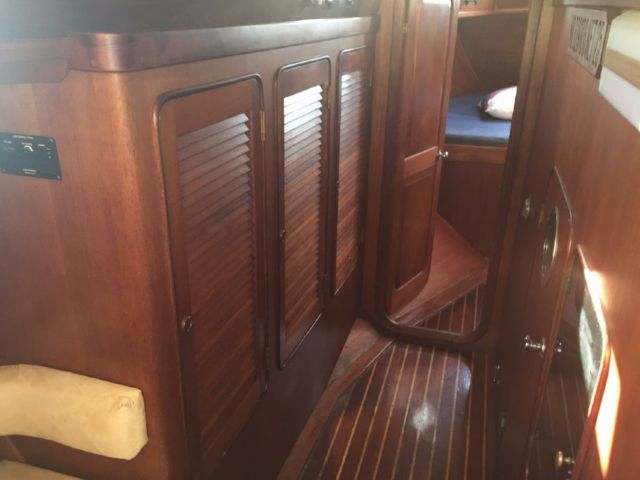
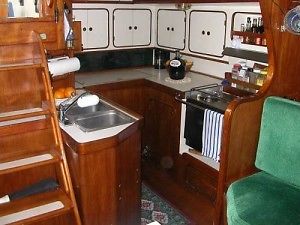
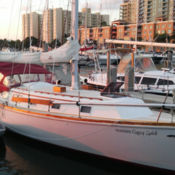 1977 Gulfstar 37 sailboat bluewater yacht
1977 Gulfstar 37 sailboat bluewater yacht
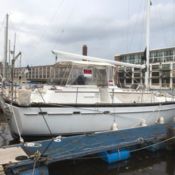 1983 50 ft. Gulfstar Sailmaster center cockpit 'live-a board' sailboat
1983 50 ft. Gulfstar Sailmaster center cockpit 'live-a board' sailboat
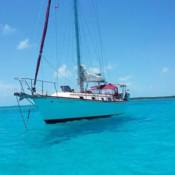 1977 Gulfstar 37 fully equipped cruising sailboat yacht, tons of upgrades
1977 Gulfstar 37 fully equipped cruising sailboat yacht, tons of upgrades
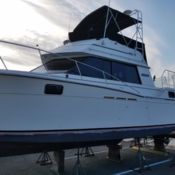 Carver 3207 Aftcabin
Carver 3207 Aftcabin
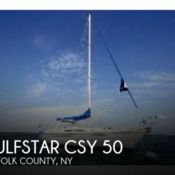 1987 Gulfstar CSY 50 Used
1987 Gulfstar CSY 50 Used
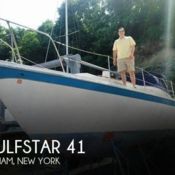 1973 Gulfstar 41 Used
1973 Gulfstar 41 Used
 1976 Gulfstar 37 Used
1976 Gulfstar 37 Used
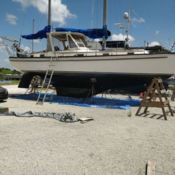 Gulfstar 41 aux ketch
Gulfstar 41 aux ketch
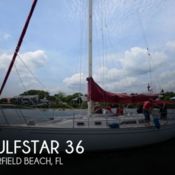 1983 Gulfstar 36 Used
1983 Gulfstar 36 Used
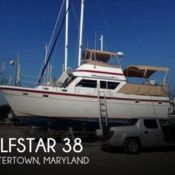 1983 Gulfstar 38 Used
1983 Gulfstar 38 Used